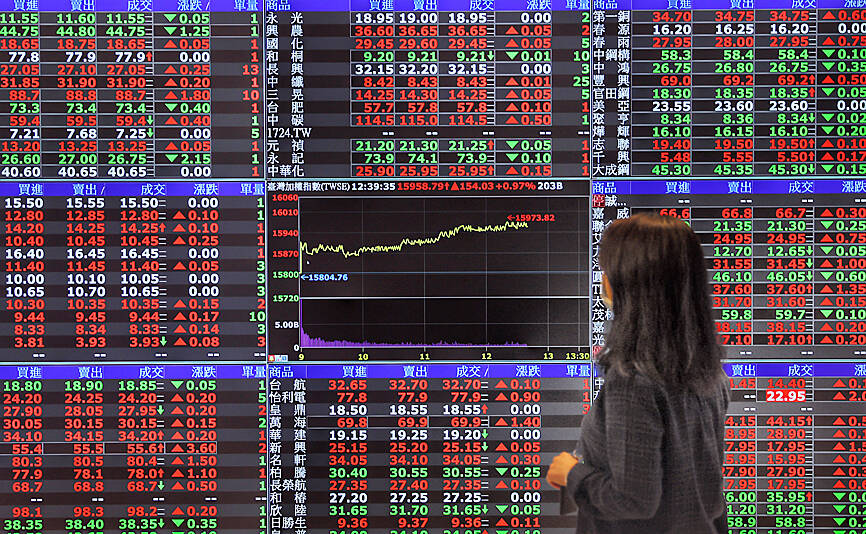The TAIEX yesterday rallied 0.79 percent, or 124.67 points, to 15,929.43, as cooling inflation in the US fed hope for interest rate hike pauses, overriding concerns over the National Stabilization Fund’s decision to exit the market, officials and analysts said.
The local bourse took cues from Wall Street, where investors breathed a sigh of relief after the US producers’ price index last month declined 0.5 percent from February and grew a weaker-than-expected 2.7 percent year-on-year, making further rate hikes unnecessary.
Deputy Minister of Finance Frank Juan (阮清華), who is executive secretary of the National Stabilization Fund, said there is no need to worry about the fund’s exit, which would be done gradually to limit its impact.

Photo: CNA
The government in July last year activated NT$500 billion (US$16.41 billion) of the fund to shore up local shares that took a hard hit amid drastic interest rate hikes by major central banks to combat steep inflation.
“The rally [yesterday] confirmed the health of local shares and investors should have confidence,” Juan told reporters on the sidelines of a public function.
The National Stabilization Fund on Thursday said it would end its longest streak of intervention, during which the TAIEX gained 13.29 percent from 13,950 to 15,804.
The National Stabilization Fund was mostly inactive last quarter, Juan said.
It had spent NT$54.5 billion as of the end of last month to shore up local shares, generating more than NT$8 billion in unrealized gains, or a return of 13.01 percent, data showed.
“The fund has not spent extra money since the end of last year, indicating that the market has recovered on its own and the fund has served its purpose,” Juan said.
Turnover yesterday totaled NT$249.613 billion after foreign institutional players increased their combined stake by NT$14.91 billion, while proprietary dealers added NT$327 million, Taiwan Stock Exchange data showed.
Mutual funds trimmed their combined net position by NT$676.41 million, the data showed.
Heavyweight players such as Taiwan Semiconductor Manufacturing Co (台積電) closed up 1.18 percent at NT$516 ahead of its earnings conference on Thursday next week.
The increase reversed days of retreat after the world’s largest chip supplier on Monday released its first-quarter revenue, which missed its guidance, analysts said.
Tourism firms lent a helping hand after delivering combined revenue on par with business improvement expectations, analysts said.
Shares of Formosa International Hotels Corp (晶華國際酒店集團) grew 4.06 percent to NT$295, while Lion Travel Service Co (雄獅旅行社) closed up 9.82 percent, near the daily limit, at NT$179, exchange data showed.
Speaking on the sidelines of a legislative hearing in Taipei, Vice Premier Cheng Wen-tsan (鄭文燦) said it appeared that foreign institutional investors were ready to rebuild their holdings in the local stock market, which is another reason that the stabilization fund committee at a meeting on Thursday said that it would terminate its intervention.
While the fund would unload the shares it has acquired during its 275-day intervention, that would not affect stock prices, Cheng said.
Additional reporting by CNA

KEEPING UP: The acquisition of a cleanroom in Taiwan would enable Micron to increase production in a market where demand continues to outpace supply, a Micron official said Micron Technology Inc has signed a letter of intent to buy a fabrication site in Taiwan from Powerchip Semiconductor Manufacturing Corp (力積電) for US$1.8 billion to expand its production of memory chips. Micron would take control of the P5 site in Miaoli County’s Tongluo Township (銅鑼) and plans to ramp up DRAM production in phases after the transaction closes in the second quarter, the company said in a statement on Saturday. The acquisition includes an existing 12 inch fab cleanroom of 27,871m2 and would further position Micron to address growing global demand for memory solutions, the company said. Micron expects the transaction to

Vincent Wei led fellow Singaporean farmers around an empty Malaysian plot, laying out plans for a greenhouse and rows of leafy vegetables. What he pitched was not just space for crops, but a lifeline for growers struggling to make ends meet in a city-state with high prices and little vacant land. The future agriculture hub is part of a joint special economic zone launched last year by the two neighbors, expected to cost US$123 million and produce 10,000 tonnes of fresh produce annually. It is attracting Singaporean farmers with promises of cheaper land, labor and energy just over the border.

US actor Matthew McConaughey has filed recordings of his image and voice with US patent authorities to protect them from unauthorized usage by artificial intelligence (AI) platforms, a representative said earlier this week. Several video clips and audio recordings were registered by the commercial arm of the Just Keep Livin’ Foundation, a non-profit created by the Oscar-winning actor and his wife, Camila, according to the US Patent and Trademark Office database. Many artists are increasingly concerned about the uncontrolled use of their image via generative AI since the rollout of ChatGPT and other AI-powered tools. Several US states have adopted

A proposed billionaires’ tax in California has ignited a political uproar in Silicon Valley, with tech titans threatening to leave the state while California Governor Gavin Newsom of the Democratic Party maneuvers to defeat a levy that he fears would lead to an exodus of wealth. A technology mecca, California has more billionaires than any other US state — a few hundred, by some estimates. About half its personal income tax revenue, a financial backbone in the nearly US$350 billion budget, comes from the top 1 percent of earners. A large healthcare union is attempting to place a proposal before